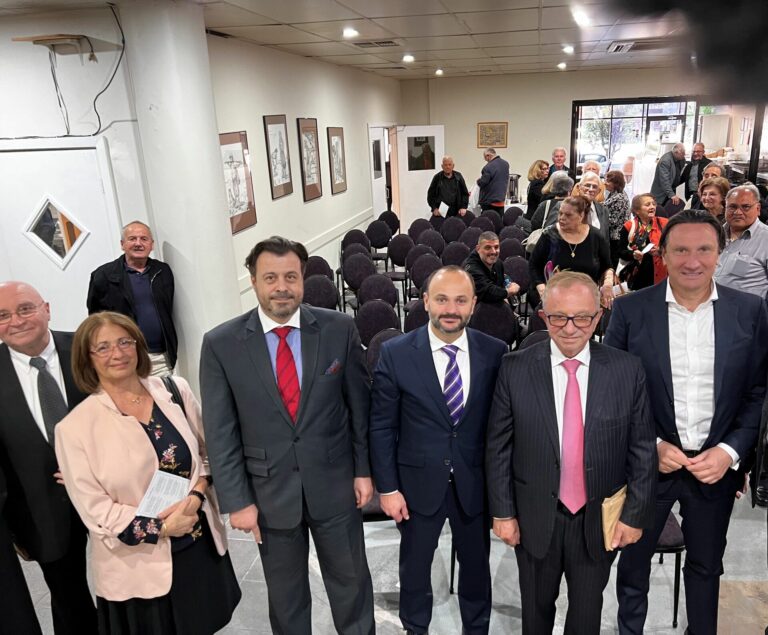On Sunday October 2 the Cyprus Community of Melbourne, Victoria, celebrated the island nation’s independence from British colonial rule in 1960.
Theo Theophanous – a former minister in the Victorian Labor government – the president of the Cyprus Community of Melbourne, Victoria, told Neos Kosmos that the community were there to “celebrate and commemorate Cyprus’ independence.”
“We have an obligation to celebrate and commemorate the anniversary of independence. Celebrate because we achieved independence, but that came after armed struggle by the Cypriot people, so we commemorate those people that fought and died to gain independence from British colonial rule.”
Cyprus’ independence was drafted in blood. The British military forces and intelligence services in Cyprus have been accused of a campaign of torture and extrajudicial killings during the 1955 to 1959 uprising.
At least 14 Cypriots were tortured, then murdered by British forces in the late 1950s this was confirmed in 2019 after extensive forensic evidence and witness testimonies and England paid £1m damages to 33 Cypriots were tortured by British forces. Among them was a girl, 16-years-old at the time, who was repeatedly raped by soldiers.
Mr Theophanous said that the “armed struggle between 1954 and 1959 culminated in the Zurich agreement of 1960 which gave Cyprus independence,” Mr Theophanous said.
The campaign was led by Archbishop Makarios of the Cyprus Orthodox Church and by Colonel George Grivas, Head of Ethniki Organosis Kuprion Agoniston – National Organisation of Cypriot Fighters (EOKA).
Mr Theophanous said that the Zurich Agreement, which provided guarantor status to Greece, Britain, and Turkey, was “used as excuse used by Turkey to invade the island in 1974 and take 38 per cent of it.”

Turkey launched the invasion of Cyprus on 20 July 1974, after a Cypriot coup d’état on 15 July 1974. The coup was ordered by the military junta in Greece and staged by the Cypriot National Guard in conjunction with the ultra-nationalist paramilitary, EOKA B.
It deposed the Cypriot the elected president Archbishop Makarios III and installed Nikos Sampson. The aim of the coup was the union (enosis) of Cyprus with Greece, and the Hellenic Republic of Cyprus to be declared.
The Turkish state launched a full-scale invasion with over 40,000 troops. They employed napalm, arial bombardment, indiscriminate detentions, and illegal extradition of Greek Cypriots to mainland Turkey.
The invasion resulted in 145,000 displaced people and refugees, many deaths, over 2,000 missing – mainly boys and men – and one third of the Cyprus still under illegal occupation.
For Mr Theophanous what for some may look like an intractable division between Turks and Greeks can be reconciled only if Turkey elects a more moderate leader.
“The Turkish elections next year are critical, if Mr Erdogan gets re-elected it will be difficult for a unified Cyprus to materialise as he has taken a stance of two separate nations.”
“We are hoping for a more moderate leader to be elected.”
The event included a doxology by Bishop Evmenios of Kerasountos in front of various community, government and diplomatic dignitaries and the community. The High Commissioner for Cyprus in Australia Antonis Sammoutis, the Consul General for Greece in Melbourne, Emmanuel S. Kakavelakis and Bill Papastergiadis, the president of the Greek Community of Melbourne also spoke. Dr. Maria Herodotou, the former head of Latrobe University’s Greek studies program spoke on history of Cypriot independence and it’s meaning.
Mr Papastergiadis in his public speech said he has sought a position from the Australian government incursions by Turkey into Greek and Cypriot natural gas reserves. He said he raised the issue with the Foreign Minister of Greece Nikolaos Dendias when they met. The speeches were followed by a performance by Helen Yotis Patterson, who sang a range of revolutionary and progressive songs.









